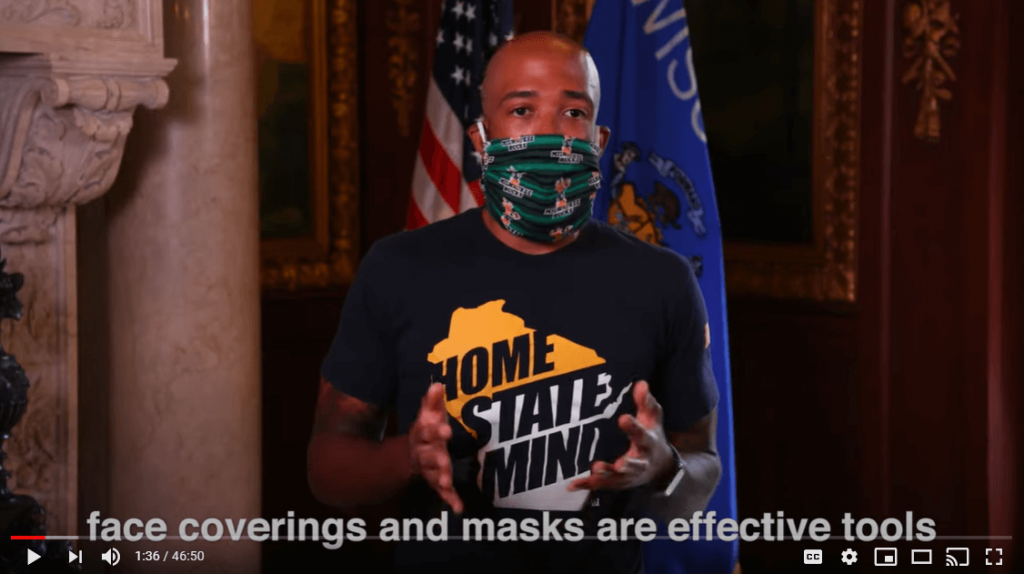Barnes Urges Social Distancing to Slow COVID-19 Spread
The lieutenant governor says people need to exercise caution heading into cold weather.

Lt. Gov. Mandela Barnes appears in a PSA on COVID-19 prevention. (Screen capture from DHS YouTube broadcast)
With public health almost entirely dependent on voluntary behavior and few enforced restrictions, Lt. Gov. Mandela Barnes telephoned Friday to get the word out: Wisconsin residents need to do what it takes to stop the spread of COVID-19.
“We’re encouraging extreme caution for people across the state,” Barnes said in a phone interview. Compared especially to April and May, still the early months of the pandemic, “we are in a worse position when it comes to the rate of transmission.”
The routine has been the same for months, but over time, its observance has been lagging. Barnes’ mission on Friday was to put it back in front of the public, in this instance by making the rounds with the state’s news outlets.
With the change in weather, “it’s a dangerous phase that we’re in right now,” Barnes said. Over the summer, “it was easier for people to go outside and enjoy themselves and distance in a way that contracting the virus was not as likely.”
During the summer, “when people were at bars it was comfortable to be out on the patio,” he said. Now the temperatures are dropping. Football is back on, and while stadiums are empty except for the players, “people are still congregating” — indoors.
“It’s the same way [with] the regular flu or the common cold — that’s how those viruses are more easily transmitted. Not because the temperature’s dropped, but because of people’s behavior” — gathering in close quarters where germs spread more easily.
“We’re asking people to exercise caution when it comes to hanging out — a movie night, a family get together, just the same things we’ve always been talking about,” Barnes said. Social gatherings need to be put on pause, and state residents need to keep following guidance for regular, thorough hand-washing, using hand sanitizer and standing 6 feet apart from anyone outside their immediate household.
And wear masks. Barnes has made public service announcement videos, which can be seen on YouTube in advance of the weekly media briefings held by the state Department of Health Services, urging people to follow the statewide mask order that Gov. Tony Evers has declared.
A great-aunt of his who was in a long-term care home was hospitalized in late summer with COVID-19. “She, fortunately, has recovered,” said Barnes. “But I recently had a regular doctor visit. And my doctor told me that he lost over 30 patients, himself, in March and April alone.”
He paused at the sheer volume. Given the time that has elapsed, it might be closer to 40, he said.
“It’s an inordinate number for any doctor,” he said, and his voice hushed. “It was just a tough time.”
Barnes recounted a recent notice from the Winnebago County Health Department: “It said that without a change in community behavior, hospitals will be overwhelmed in the next several weeks or less. And that is a very scary thought.”
Changing our behavior isn’t easy, he acknowledged. For many people, “it takes a close encounter. And that’s the scary part — it shouldn’t take that.”
Maybe we should think of the changes in our behavior needed to curb COVID-19 — giving up the pleasure of the crowd, giving up the freedom to go out without covering our nose and mouth with a piece of cloth, giving up the carefree ability to not fear an encounter with the invisible and intractable virus — as comparable to giving up smoking or drinking.
Offered that suggestion, Barnes agreed.
Already evidence is showing that the virus mutates in subtle ways, Barnes pointed out, adding, “Who knows what the outcome is going to be?”
There’s one message over all that Barnes hopes to get across.
“You know, while people may think that they are immune, or even people that are willing to take a risk for their own health — it is more than just your own health,” he said. “It’s much bigger than you as an individual.”
Reprinted with permission of Wisconsin Examiner.
More about the Coronavirus Pandemic
- Governors Tony Evers, JB Pritzker, Tim Walz, and Gretchen Whitmer Issue a Joint Statement Concerning Reports that Donald Trump Gave Russian Dictator Putin American COVID-19 Supplies - Gov. Tony Evers - Oct 11th, 2024
- MHD Release: Milwaukee Health Department Launches COVID-19 Wastewater Testing Dashboard - City of Milwaukee Health Department - Jan 23rd, 2024
- Milwaukee County Announces New Policies Related to COVID-19 Pandemic - David Crowley - May 9th, 2023
- DHS Details End of Emergency COVID-19 Response - Wisconsin Department of Health Services - Apr 26th, 2023
- Milwaukee Health Department Announces Upcoming Changes to COVID-19 Services - City of Milwaukee Health Department - Mar 17th, 2023
- Fitzgerald Applauds Passage of COVID-19 Origin Act - U.S. Rep. Scott Fitzgerald - Mar 10th, 2023
- DHS Expands Free COVID-19 Testing Program - Wisconsin Department of Health Services - Feb 10th, 2023
- MKE County: COVID-19 Hospitalizations Rising - Graham Kilmer - Jan 16th, 2023
- Not Enough Getting Bivalent Booster Shots, State Health Officials Warn - Gaby Vinick - Dec 26th, 2022
- Nearly All Wisconsinites Age 6 Months and Older Now Eligible for Updated COVID-19 Vaccine - Wisconsin Department of Health Services - Dec 15th, 2022
Read more about Coronavirus Pandemic here


















